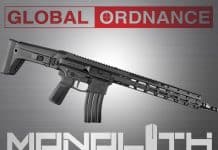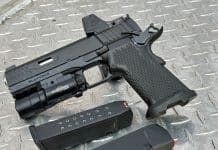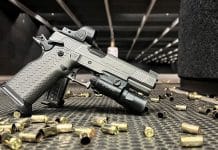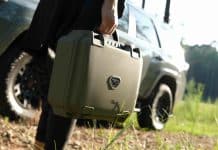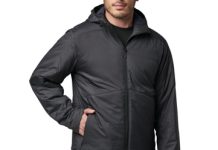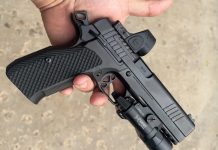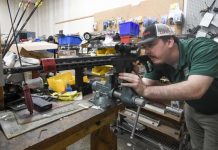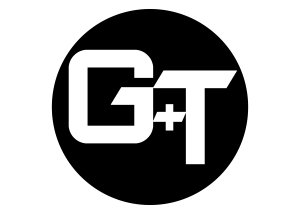The importance of having a good rangefinder cannot be overstated. You could miss out on the shot of a lifetime on a hunt you scrimped and saved for years to take. Or you could score just a hair too low on a long-range shot and lose the match. Regardless of the situation, knowing that failure could have been avoided if only you’d had a good rangefinder is heartbreaking.
With that in mind, let’s take a look at three of the best options available today. We’ll rate them “Good, Better, and Best” according to features and prices and let you be the judge as to which one is best for you. After all, you may not need all the fancy features and capabilities of the one rated “Best.” The “Good” option really might be best for you!
Good

Bushnell Scout DX 1000 ARC Rangefinder
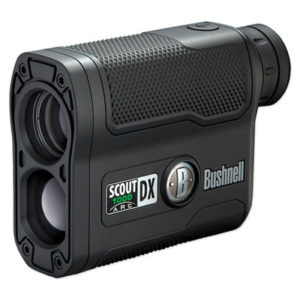 $299.99
BUY IT HERE
$299.99
BUY IT HERE
Bushnell has been a trusted name in the optics world for more than 50 years, so it should come as no surprise that they make this list.
The Scout DX 1000 ARC can provide true horizontal measurements out to 99 yards, is accurate to 1/10th of a yard at 199 yards, and even provide drop and holdover measurements out to 300 yards, eliminating any guesswork or quick math in your head. Just put the Scout on target, read the display, and make the shot. Or, as their tagline says: “Easy arithmetic: one button, four hooves in the air.”
This rangefinder has “1000” in its name because it works from 5 to 1,000 yards. It’s also capable of 6x magnification, so the only reason for missing the shot is if you blow it – no blaming the equipment here!
The Scout DX 1000 weighs just 6.6 ounces, is waterproof and fog-proof, and comes with a neck strap, carrying case, and one battery.
Better

Vortex Optics Ranger 1800 Rangefinder
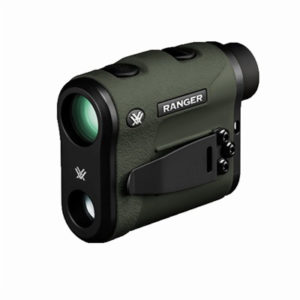 $349.99
BUY IT HERE
$349.99
BUY IT HERE
Like the rangefinder from Bushnell, the Vortex Optics Ranger 1800 is so named because it’s good out to 1,800 yards.
The primary mode for the Ranger 1800 is called HCD, or Horizontal Component Distance. It will correct for shot angle and make all of the computations in an instant. Though you may be at 500 yards line of sight, your slope could make the shot 385 yards, and that’ll be the number that shows on your display.
It can calculate up to 30-degrees out to 400 yards and up to 15-degrees out to 800 yards, so the Ranger 1800 is really up to the task.
If you’ve got your drop charts made up for your favorite rounds in your favorite rifle, then the secondary LOS mode – Line of Sight – is for you. The rangefinder will give you the distance and let you handle the rest.
This model is waterproof and fog-proof and has three brightness settings in the display, ensuring that you’ll be able to see it in any lighting condition.
The Vortex Optics Ranger 1800 weighs 11.8 ounces and comes with a neck lanyard, but it also has a pocket clip, which is an excellent alternative if you don’t want something hanging around your neck.
Best

Sig Sauer Kilo2400 BDX Rangefinder
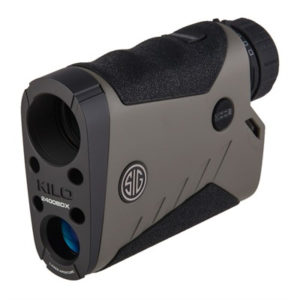 $799.99
BUY IT HERE
$799.99
BUY IT HERE
The Sig Sauer Kilo2400BDX has a maximum range of – you guessed it – 2,400 yards. Think about that for a second that’s more than a mile! This rangefinder is up to even the most challenging of targets in long-range competition. It’s equally at home finding shorter distances while hunting.
The display uses OLED technology to provide optimum brightness in the sun or snow and can even dim down to levels close to that of night vision if you’re using it in a low-light/dusk environment.
Sig Sauer designed this rangefinder to work with its BDX technology found in their scopes, but you can still use it without one of their optics. If, however, you do have their SIERRA3BDX optic, the Kilo2400BDX will send the calculations via Bluetooth to the scope and display your shot placement right on the reticle. You can also store up to 25 ballistic profiles in Sig’s app and use those in conjunction with the optic and this rangefinder.
Weighing just 4 ounces and capable of up to 7x magnification, there’s a lot of technology built into this small package. Yes, it comes at a price, but I guess that’s the price you pay for the convenience of linking your custom ballistic profile to your rangefinder and having it relay the proper shot placement onto your scope reticle via Bluetooth! If that’s not crazy advanced, then I don’t know what is!
Final Wrap-Up
Whether you choose a rangefinder that costs less than $150 or one that’s $800, the end goal is all the same: to give you the best data possible so that you can make the shot when it counts most. If you miss the shot, none of it matters anyway. Get what you can afford, get in the field, and “aim small, miss small.”
Check out more in our Blog section.
Want more posts like this one? Subscribe to Guns & Tactics to receive email updates and special offers direct to your inbox!
Social Links:
– The views and opinions expressed on this web site are solely those of the original authors and contributors. These views and opinions do not necessarily represent those of Guns & Tactics, the administrative staff, and/or any/all contributors to this site.
– Affiliate Disclaimer: Guns and Tactics is reader/viewer supported. This post may contain affiliate links and we may earn a small commission when you click on the links at no additional cost to you. As an Amazon Affiliate I earn from qualifying purchases.



